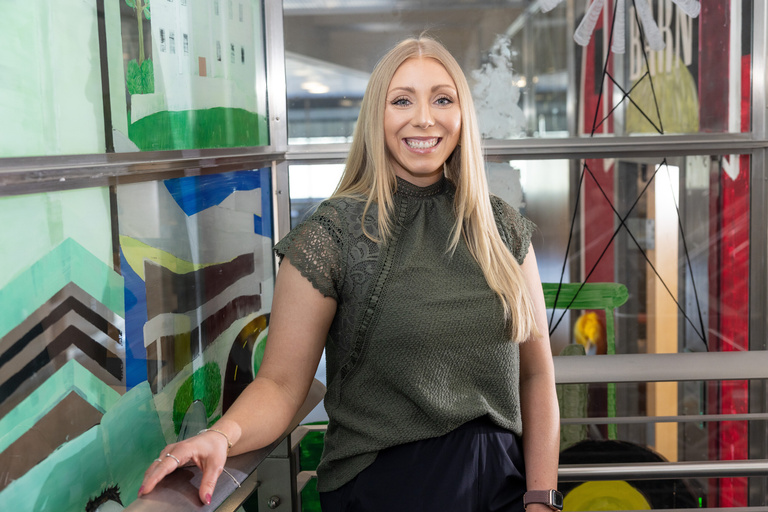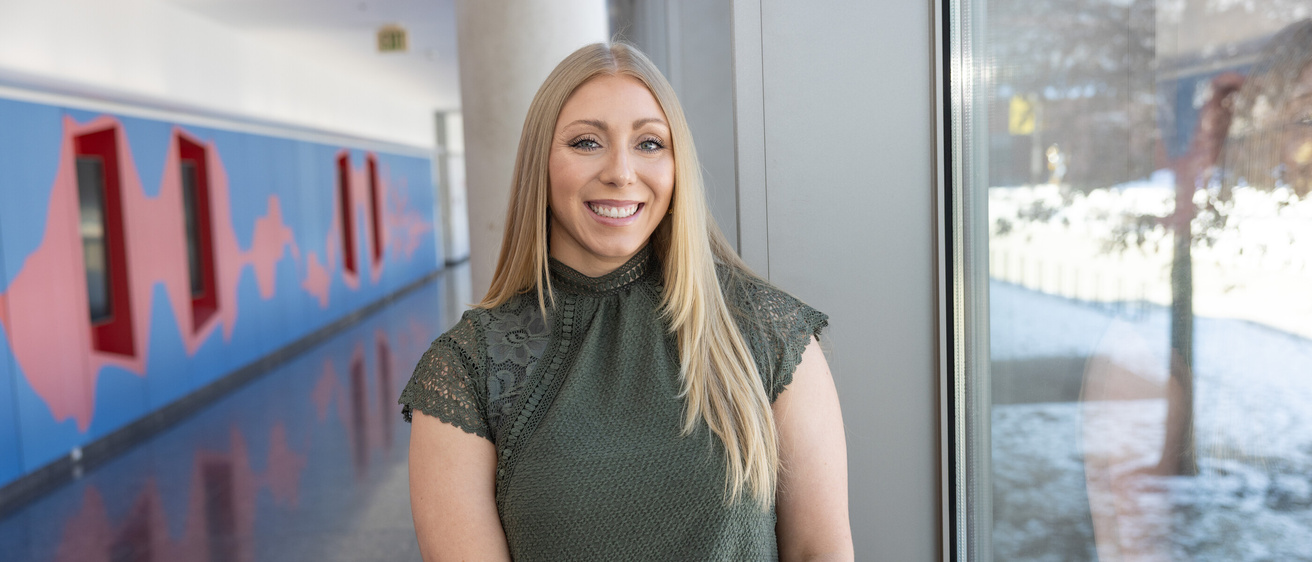When Andrea Fjelstul-Bonert, MD, was in fourth grade, her dad fell from the top of his semi-trailer truck and was seriously injured.
“Seeing him navigate the health care system from a rural community — whether that be trying to find a good primary doctor to coordinate things or traveling an hour away to see specialists — really inspired me to want to practice rural family medicine,” she says.
Fjelstul-Bonert grew up in Hopkinton, Iowa, a small farming community about an hour northeast of Cedar Rapids.
“I hope to go back home and take care of the community that helped shape me into who I am today,” she says.
Her father recovered, but the experience left a lasting impact on her.
“It shaped me into the future physician that I want to be,” she says.
Fjelstul-Bonert is now in her first year of family medicine residency with Genesis Health System in Davenport, after receiving her MD from the University of Iowa Carver College of Medicine in May 2025.
Finding her calling
While there isn’t one specific moment when Fjelstul-Bonert knew she wanted to be a doctor, she says her dad’s accident sparked an interest in helping others.
That calling deepened during her rotations at the Carver College of Medicine.
“I got to take care of a mom at her last prenatal appointment, and I actually got to deliver the baby,” she says. “A couple of days later, I saw the baby for his first newborn appointment. That kind of solidified it for me.”
This was the moment she knew she wanted to pursue family medicine.
"The kind of physician that I aspire to be is one that establishes trust easily, one that listens well to my patients, and one that really strives to take care of the whole patient."
- Andrea Fjelstul-Bonert, MD
Fjelstul-Bonert says her ultimate goal is to take care of entire families from birth to end-of-life care, an aspect of rural family medicine she finds special.
“I chose to go into family medicine because I’m from a rural community,” she says. “I’ve seen firsthand the care gaps, and I just have a really strong desire to go back home and help close those gaps.”
Gerry Clancy, MD, senior associate dean of external affairs at the Carver College of Medicine, says Fjelstul-Bonert’s approach reflects the mission that drives University of Iowa Health Care programs statewide.
“When you train in Iowa, you’re not just training to practice medicine,” he says. “You’re training to serve Iowans. That’s the heart of our mission at UI Health Care.”
Discovering CRISP
When Fjelstul-Bonert applied to medical school, she knew she wanted to go somewhere that emphasized rural health care.
“I love that the Carver College of Medicine has a CRISP program which allows students to be exposed to rural primary care and have unique opportunities,” she says. “And then there’s a financial incentive at the end of that to practice in state. I already knew I wanted to go back and practice in a rural community, so it’s just a bonus to have that as well.”
The Carver Rural Iowa Scholars Program (CRISP) combines mentoring, community-based rotations, and loan-repayment incentives of up to $100,000 for graduates who return to serve in qualifying Iowa communities for five years.
CRISP is one of several ways UI Health Care is helping people like Fjelstul-Bonert achieve their dreams while addressing a physician shortage in Iowa. Rural areas are seeing some of the biggest impacts — farmers waiting months for a check-up, people without access to a mental health provider, and women driving long distances to deliver their baby.
UI Health Care recently expanded CRISP from four to eight students per class. Of the students who were involved in CRISP and have completed residency, 83% are currently practicing in Iowa. Of those CRISP graduates in Iowa, 86% currently practice in rural Iowa. The number will grow to 93% in early 2026 after an alumna completes her fellowship.
Service in action

For her CRISP capstone, Fjelstul-Bonert and two classmates developed a project to give first-year medical students earlier exposure to rural practice.
She also helped create a statewide mentorship list for students interested in rural medicine.
“We reached out to local rural hospitals in our region of the state and found providers who are interested in becoming mentors for students,” she says. “We’re putting all of those providers together in a list that’s easily accessible for all students, not just students in CRISP, to be able to reach out and have a mentor in the community.”
For Fjelstul-Bonert, who was a first-generation college student, service has always been important.
“I started out in medical school volunteering at the Upstream Initiative clinic, which provides resources for patients who are pregnant at the high-risk obstetrics (OB) clinic,” she says.
She also volunteered at the free medical clinic on OB nights, caring for refugees and immigrants.
“We did some research on the typical foods that patients from these populations eat so that we could provide better, more personalized recommendations on ways to control their blood sugar,” she says. “Knowing that information can make such a difference.”
Cody Pritchard, MSEd, the co-director for CRISP, says Fjelstul-Bonert's work reflects what the program was designed to accomplish.
“CRISP is about creating opportunities for students to see what practicing in a rural community looks like early on in their training,” he says.
Looking ahead
In five years, Fjelstul-Bonert sees herself practicing near her hometown of Hopkinton, taking care of entire families.
“The kind of physician that I aspire to be is one that establishes trust easily, one that listens well to my patients, and one that really strives to take care of the whole patient,” she says.
As she works toward that goal, Fjelstul-Bonert says she’s ready to put those values into practice.
“I’m just excited to continue to learn and to continue to make an impact on patients as I learn to become the best doctor that I can be,” she says.
